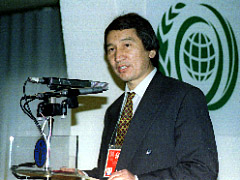


KYRGYZ REPUBLIC - REPUBLIQUE KIRGHIZE - REPUBLICA KIRGUISA | ||
His Excellency Bekbolot Talgarbekov, Vice Prime Minister of the Kyrgyz Republic | ||

I would like to thank the Italian people for their cordial hospitality and for the excellent reception that we have received. As is known, after the collapse of the Soviet Union, the Newly Independent States, have been confronted with complicated political and economic problems. Since gaining its independence, Kyrgyzstan, under the leadership of the President, Mr. Akayev, has successfully coped with the political problems which it has encountered. The democratic transformation of society is still going on. Civic peace and inter-ethnic relations have been preserved. The relations between Kyrgyzstan and other states and international organizations have been set up. Invaluable support has been given during this difficult transitional period when we were able to establish our own true statehood and as such, help has been given to us by Japan and the United States of America, Germany, Switzerland and many others, as well as by international organizations such as, the World Bank, the International Monetary Fund, the European Commission, and the Asian Development Bank. Thanks to its economic policy, it has been able to avoid the instability which often occured after the fall of the Soviet Union. Agricultural reform is being actively carried out in my country. More than 75 percent of the land was allocated to farmers as their own property. Direct state intervention into their affairs no longer exists and the principles of free trade are being introduced. Fortunately, such phenomena as hunger no longer exist. The last two years have shown an increase in the production in the agricultural sector of the economy. Furthermore, Kyrgyzstan cannot boast of its rich natural resources, so our Republic needs investments to boost and modernize the priority sectors of its economy and infrastructure. For example, those in agriculture are: · The development of food and processing industries; · Increasing soil fertility; and · Establishment of a new credit system. To cope with these tasks, around US$ 150 million is needed. Unfortunately, we do not have this amount of money. That is why we have to apply for credit from other States and we have to apply to international organizations. In this connection, our approach towards one of the biggest organizations, FAO, is quite logical. Having observed FAO's activities and listened over four days to the statements made by its Member States, we have come to the conclusion that, through this Organization, developed countries are pursuing their political tasks, while the poorest wish to solve their economic problems. At the same time, the majority of the new States of the former Soviet Union cannot be considered as belonging either to the first group or to the second of these groups. They have become, I think we could say, a kind of a passive participant, a sort of observer. Thus the question is being asked: What is the policy of FAO towards the Newly Independent States? We think that this is a matter that has to be looked at very carefully. | ||
|
|
|
|

 |